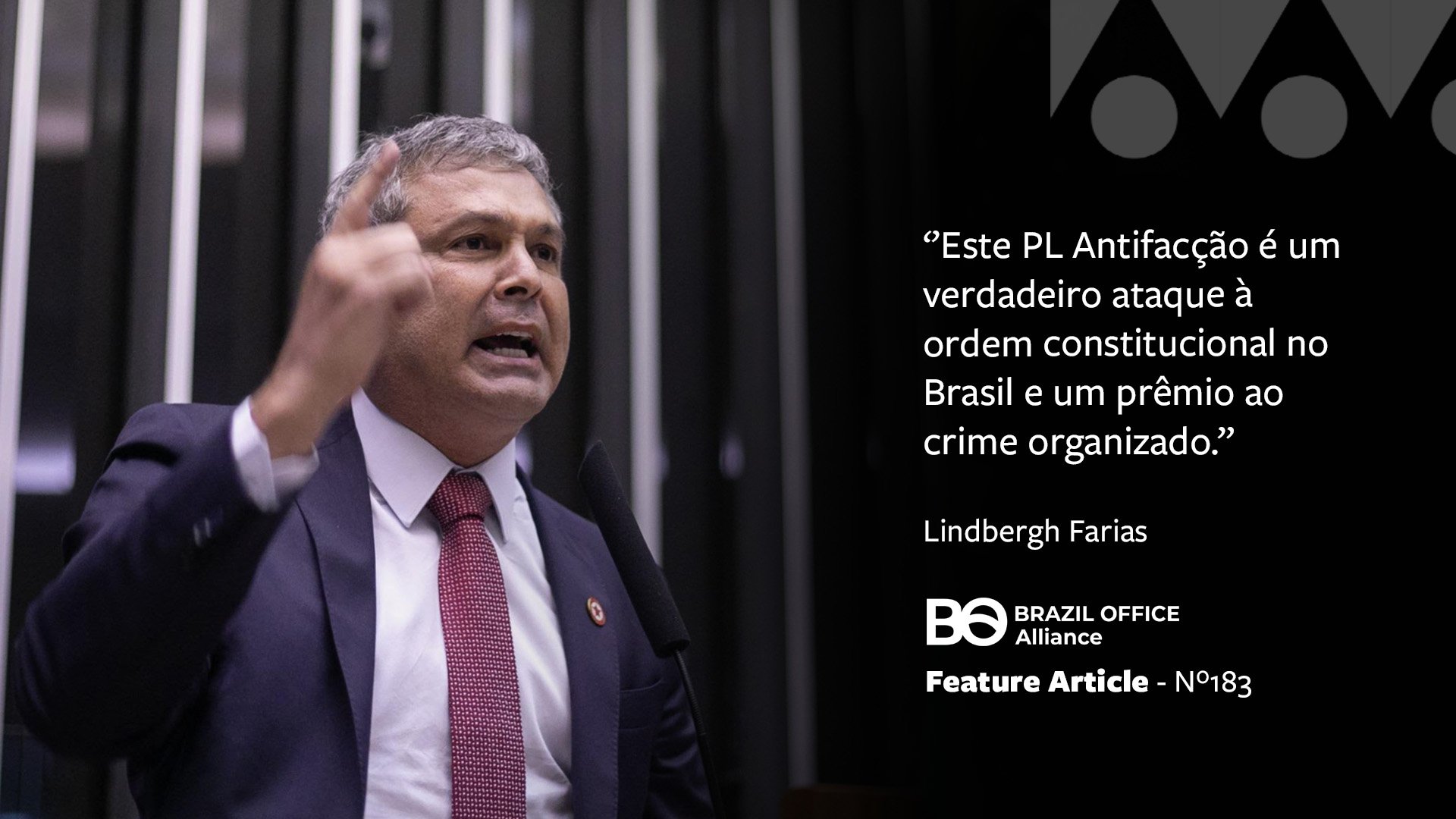Why does the Brazilian right want to weaken the Federal Police?
By Lindbergh Farias*
The opinions of São Paulo's licensed security secretary, Bolsonaro deputy Guilherme Derrite (PP), on Bill 5.582/2025, known as the Anti-Crime Bill, are a real attack on Brazil's constitutional order and a reward for organized crime.
The sixth version of the "Frankenstein" substitute for the Anti-Trafficking Bill, approved on November 18 by the Chamber of Deputies, deepens the regulatory disorganization and maintains serious structural defects, especially by removing resources from the Federal Police, weakening the national coordinating body and going against the spirit of the Proposal for a Constitutional Amendment on Public Security sent by the Lula government to Congress.
Instead of strengthening the Federal Police, the text promoted a fragmentation of the budget in relation to the funds that compromises efficiency in the fight against criminal organizations operating interstate. This is an affront to the Anti-Trafficking Bill sent by the Lula government to Congress.
The substitute also dismantled the policy of decapitalizing factions by eliminating the special precautionary measures provided for in the original bill, replacing them with existing instruments and creating the fiction of an "autonomous civil action", which only adds to the delay, legal uncertainty and pulverization of asset recovery procedures.
The approved bill had serious pitfalls: it took control over the sale and destruction of seized assets away from the Federal Government, striking at the heart of the policy to decapitalize factions. Instead of strengthening the state, it decapitalized the Federal Police and made it more difficult to forfeit organized crime assets. The creation of an autonomous civil action for the confiscation of assets is a legal farce that will delay confiscation and reduce the resources of the Federal Police in the fight against crime.
The Bolsonaro deputy attacked the backbone of the Anti-Fraud Bill - precisely its ability to quickly block illicit funds and strike at the financial heart of criminal groups.
In addition, the far-right congressman invented categories with no legal basis, such as "ultra-violent organization", in an attempt to erase the strict terminology of "criminal faction" introduced in the federal government's original text.
This kind of conceptual improvisation weakens criminal policy, confuses legal operators and masks the real objective: to disfigure the Executive's technical and consistent proposal, replacing it with a pile of empty concepts and contradictory provisions. In practice, this confusion creates legal chaos that will only favor the lawyers of criminal gangs.
Why didn't Derrite propose changes to the Law on Criminal Organizations, the Penal Code and the Code of Criminal Procedure, creating a fourth legal norm, which he called the "Legal Framework for Combating Organized Crime"?
There's a lot in the air. The far-right governors have once again acted against the logic of the Security PEC, which advocates integrating and strengthening police forces. They defended the vote on the Anti-Trafficking Bill, re-establishing the logic of shielding, hurting the autonomy of the Federal Police and preventing it from acting fully against organized crime.
To understand the scenario, it's worth remembering that the offensive is no accident: the Federal Police's Operation Hidden Carbon, which hit fuel laundering and adulteration networks linked to large economic and political groups, set off alarm bells among governors and businessmen under investigation. If Derrite's proposal had been in force, more than R$1 billion from organized crime would not have been confiscated, nor would the fuel from four ships detained by the Internal Revenue Service in Rio de Janeiro.
The most emblematic example is that of Governor Cláudio Castro of Rio de Janeiro, who, fearful of the fallout from Operation Hidden Carbon, revealed possible connections between his government, the Refit company and fuel adulteration schemes associated with criminal gangs.
There is also an investigation opened by Minister Alexandre de Moraes of the Federal Supreme Court, which seeks to investigate the relationship between organized crime and public officials, which explains the discomfort and haste to dehydrate the Anti-Takingover Bill in the Chamber, as in fact happened. The firm and autonomous action of the Federal Police bothers those who fear that the truth will come out.
The attempt to subordinate the Federal Police to the governors, a practice that had been going on for 100 years, was defeated by popular mobilization. But the new movement shows that there are powerful sectors trying to retaliate against the firm action of the Federal Police, especially in investigations that touch on the links between political power, factions and militias.
The federal government has not agreed to negotiate any measure that would decapitalize and weaken the work of the Federal Police - which is the main instrument in the fight against criminal organizations and corruption - or that would make it more difficult to confiscate the assets of organized crime. But the House approved the step backwards. There can be no public security without a strong, autonomous Federal Police, free from political ties.
Recent figures show the effectiveness of the Lula government's strategy. Since 2023, integrated security actions, with the Federal Police at the forefront, have taken R$19.8 billion out of the hands of criminals - the biggest financial loss ever imposed on crime in the country. The number of Federal Police operations has grown by 80% since 2022. It is precisely this success that is disturbing.
The Antifaction Bill, with its original text (plus the Public Security PEC), sought to sustain and expand these advances, financially stifling factions and modernizing the integration of security forces. Derrite's substitute approved by the House, however, goes in the opposite direction. It is everyone's duty to vehemently reject this step backwards in order to re-establish the Lula administration's original text in the Senate.
*Lindbergh Farias is a federal deputy (RJ) and leader of the Workers' Party caucus in the Chamber of Deputies

